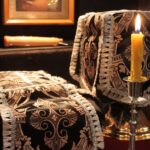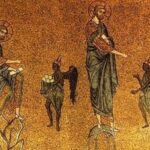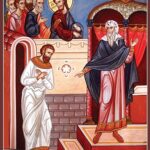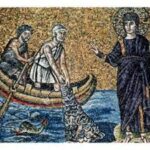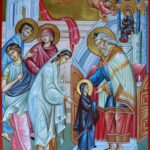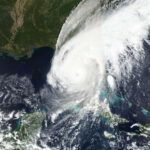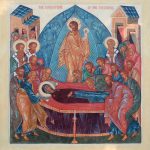by Fr. Jonathan H. Cholcher The Liturgy of Presanctified Gifts, or Presanctified Liturgy as it is popularly known, is the distinctive weekday service during the Orthodox season of Lent. “On all the days of the holy fast of Lent, except on the Sabbath (Saturday), the Lord’s day (Sunday), and the holy day of Annunciation (March 25), the Liturgy of the Presanctified is to be said” (Canon 52, Quinisext Council). In many Orthodox parishes during Lent, the Presanctified Liturgy is served at least on Wednesdays, and in some on Wednesdays and … [Read more...]
Lent 101: The Beginning of the Godly Life
by Fr. Jonathan H. Cholcher “In the beginning God made heaven and earth.” (Genesis 1:1) “The fear of God is the beginning of wisdom…godliness toward God is the beginning of perception.” (Proverbs 1:7, 8) “Hear, O heavens, and listen, O earth. For the Lord has spoken: ‘I have begotten and brought up sons, but they rejected Me…Wash yourselves, make yourselves clean. Put away the evils from your souls before My eyes. Cease from your evils. Learn to do good. Seek judgment and redeem the wronged. Defend the orphan and justify the … [Read more...]
Orthodox Fasting: Degrees, Foods, and Scriptures
CHRISTIANS ARE DISCIPLES
by Fr. Jonathan H. Cholcher “And Jesus came and spoke to [the eleven disciples], saying, ‘All authority has been given to Me in heaven and on earth. Go therefore and make disciples of all the nations, baptizing them in the name of the Father and of the Son and of the Holy Spirit, teaching them to observe all things that I have commanded you; and lo, I am with you always, even to the end of the age.’ Amen.” (Matt. 28:18-20; italics mine) What is a Christian? How do we define that term? What, if any, characteristics must a person have … [Read more...]
Homily on the Entrance of the Theotokos into the Temple
ON THE ENTRY INTO THE HOLY OF HOLIES OF THE MOTHER OF GOD AND EVER-VIRGIN MARY (November 21) by St. Gregory Palamas, Archbishop of Thessalonica (1296-1357) [This extract of Homily 53 is translated by Christopher Veniamin, in Saint Gregory Palamas the Homilies (Mount Thabor Publishing, 2009)] If someone attempts to touch the stars with his hand, even though he is tall and stretches his arm further than the rest, he is almost as far away from those ethereal heights as men of much shorter stature, the difference not being worth … [Read more...]
Fasting, Diet, and Metabolic Health
by Fr. Jonathan H. Cholcher … [Read more...]
FAITH AND VOTING
by Fr. Jonathan H. Cholcher For Americans, voting in elections is a fundamental right and duty of citizenship. This duty is such a fundamental aspect of American government that American Christians, including the Orthodox, have incorporated voting into the routine management of their churches, for instance, at monthly Parish Council meetings, annual Voters’ Meetings, and church-wide assemblies. Voting is an accepted tool for exercising the faith. In the truest Christian sense, voting should be guided by faith because faith ultimately … [Read more...]
Lessons from the Storm
by Fr. Jonathan H. Cholcher The first century Christian catechism called The Teaching (Gk., Didache) contains the following spiritual law: “Welcome activities occurring to you as good knowing that nothing happens apart from God” (3.10). Our Lord says, “God the Father makes His sun rise on the evil and on the good, and sends rain on the just and the unjust”; then, later: “Are not two sparrows sold for a copper coin? And not one of them falls to the ground apart from your Father’s will. But the very hairs of your head are all numbered. Do … [Read more...]
RELIGION OF THE ANTICHRIST
by Fr. Jonathan H. Cholcher “It was granted to [the beast] to make war with the saints and to overcome them. And authority was given him over every tribe, tongue, and nation. All who dwell on the earth will worship him, whose names have not been written in the Book of Life of the Lamb slain from the foundation of the world.” (Revelation 13:7-8) The Book of Revelation describes the spiritual condition of the world between Christ’s Ascension into heaven and His coming again in glory on the Last Day. The spiritual condition of the world, … [Read more...]
The Dormition Fast (August 1-14)
by Fr. Jonathan H. Cholcher In Orthodox practice, the Dormition Fast is the two week-long fast beginning on August 1 which concludes with the Feast of the Dormition (lit., falling-asleep) of the Ever-Virgin Mother of God Mary on August 15. The Dormition Fast is the fourth and final fasting season of the Church year (together with Advent/Nativity Fast [Nov. 15-Dec. 24]; Great Lent [40 days before Holy Week]; and the Apostles Fast [eighth day after Pentecost to June 29]); the Church new year begins on September 1. Saint Leo the Great, … [Read more...]
- « Previous Page
- 1
- 2
- 3
- 4
- 5
- …
- 8
- Next Page »
